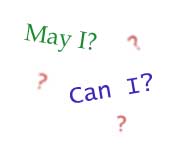"Mother,
may I?" sounds like an appropriate children's game for this month.
Maybe you remember taking baby steps, medium steps, giant steps, scissor
steps, bunny hops and others to try to be the first to touch the
"mother," with her back turned. A requirement, of course, was
that you had to say, "Mother, may I?" before you made a move.
 The name of
the game also reminds me of indoor school activities connected with the
word "may." In the classroom, recreation wasn't the emphasis,
but there was a relaxing touch of humor shared by teacher and students.
Maybe it wasn't quite as amusing for anyone who happened to ask the wrong
question without considering the grammatical implications, but I'm sure
the teacher wanted to help us learn also from our mistakes.
The name of
the game also reminds me of indoor school activities connected with the
word "may." In the classroom, recreation wasn't the emphasis,
but there was a relaxing touch of humor shared by teacher and students.
Maybe it wasn't quite as amusing for anyone who happened to ask the wrong
question without considering the grammatical implications, but I'm sure
the teacher wanted to help us learn also from our mistakes.
 The
prerequisite was that the teacher had already reviewed with us the proper
uses of "may" and "can." She’d go through examples
so we'd understand the difference. We'd practice using "may" to
ask for permission. We'd also make up sentences using "can."
Then we did worksheets or related pages in a workbook, filling in the
blanks with "may" or "can" to use those words
correctly in writing.
The
prerequisite was that the teacher had already reviewed with us the proper
uses of "may" and "can." She’d go through examples
so we'd understand the difference. We'd practice using "may" to
ask for permission. We'd also make up sentences using "can."
Then we did worksheets or related pages in a workbook, filling in the
blanks with "may" or "can" to use those words
correctly in writing.
The amusing
incidents could happen any time after that, or even during the initial
practice – the sooner, the better, while the lesson was fresh in our
minds. A child preoccupied with thirst – or in search of an excuse to
leave the classroom – might ask, "Can I get a drink?"
 It was a
student's version of "Open mouth, insert foot." The teacher,
perhaps suppressing a smile, might reply with emphasis, "I’m sure
you can, and yes, you may." Or the teacher might repeat
the question with an inflection designed to point out the part that needed
improvement: "Can you get a drink?" I think we usually
caught on, after a little fidgeting perhaps, and I suppose we were more
likely to remember the proper usage after that.
It was a
student's version of "Open mouth, insert foot." The teacher,
perhaps suppressing a smile, might reply with emphasis, "I’m sure
you can, and yes, you may." Or the teacher might repeat
the question with an inflection designed to point out the part that needed
improvement: "Can you get a drink?" I think we usually
caught on, after a little fidgeting perhaps, and I suppose we were more
likely to remember the proper usage after that.
More
recently, I've noticed a different way to (mis)use the word
"can" in questions. Grammatical technicalities aside, I've more
or less enjoyed it. I think most people understand what's happening, so
the language works, even if it's not perfect. At first, I smiled at the
literal messages conveyed. Then I noticed how capable I felt when someone
phrased a request this way: "Can you give me two copies";
"Can you make this fill the space"; "Can you do several
versions."
 In written
form, there usually isn't a question mark, because it usually isn't a
question. In most cases, the people aren't asking if I know how. They
wouldn't be presenting the task to me if I weren't able to comply. It's
more likely to be a work request, but the person doesn't want to be too
demanding or too formal.
In written
form, there usually isn't a question mark, because it usually isn't a
question. In most cases, the people aren't asking if I know how. They
wouldn't be presenting the task to me if I weren't able to comply. It's
more likely to be a work request, but the person doesn't want to be too
demanding or too formal.
There are
many possible ways to state the same request, of course: "I need to
have two of these right away"; "Print out two of the attached.
Put them on my desk ASAP"; "Make two copies, will you
please?" Maybe none of the above has exactly the right tone for the
situation, and the person settles on an informal, "Can you..."
So I make
two copies, feeling capable instead of being annoyed at the additional
task. Yes, I can do it. That feels good.
The
satisfaction in being able to do the job increases if the request is for a
more difficult task: "Can you match this sample"; "Can you
get this done by Friday."
There's a
limit, of course. Pride complicates the issue, too, if I waste time
fumbling around with a job I really don't know how to do on my own, in a
vain attempt to prove that I can.
 Back to the
grade school classroom, I think of the book called, "The Little
Engine That Could." After other engines turned down the job, the
little engine that had never been over the mountain gave it a try, and the
story rolled along to the refrain, "I think I can, I think I can, I
think I can."
Back to the
grade school classroom, I think of the book called, "The Little
Engine That Could." After other engines turned down the job, the
little engine that had never been over the mountain gave it a try, and the
story rolled along to the refrain, "I think I can, I think I can, I
think I can."
In real
life, children usually need to have permission for many activities that
adults do without asking anyone first. "May I?" is a gateway
through certain protective barriers. As a child's abilities increase –
as his "I can..." list grows longer – he's also allowed to do
more. "I can" and "I may" go together.
There's
satisfaction in what we're allowed to do and in what we're able to do, but
both are subject to change.
As life goes
along, the question gradually shifts from "Can I?" to "May
I?" and back to "Can I?" A child who likes the train engine
story probably doesn’t read all the books his parents do. He has some
learning and maturing to do first. Eventually he knows how and is free
from parental restrictions, but in later years the question sometimes
changes to, "Can I read this book?" – or do I have to get my
glasses first, or possibly wait until after cataract surgery.
A child
asks, "Mother, may I?" before he goes across the street to play
with friends. Years down the road, the question is whether he can –
whether his legs are up to the journey.
"May"
is a pleasant word. It's polite and well-bred. Still, there's a more
fundamental satisfaction in doing things that we can. "Yes, you
may," is one step forward. "Yes, I can," is another step, a
giant step over the mountain.


![]()
![]()